|
|
|
Sort Order |
|
|
|
Items / Page
|
|
|
|
|
|
|
| Srl | Item |
| 1 |
ID:
131518
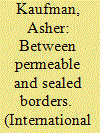

|
|
|
|
|
| Publication |
2014.
|
| Summary/Abstract |
The Trans-Arabian Pipeline (Tapline), which extended from Dhahran in Saudi Arabia to Zahrani in Lebanon and operated from 1950 to 1982, was haunted by the Arab-Israeli conflict throughout the years of its operation. The route of the pipeline-which traversed Saudi Arabia, Jordan, Syria, and Lebanon-was chosen so as to circumvent Palestine/Israel. However, following the Israeli occupation of the Golan Heights in the 1967 war, Israel became an active participant in this project, with the full consent of the transit states and Egypt. This article uses Tapline as a means to analyze the interconnected world facilitated by oil pipelines, which defies common wisdom about state sovereignty or the function of interstate boundaries. In addition, Tapline demonstrates how this interconnected network created possibilities for Arab-Israeli cooperation that might have seemed inconceivable initially, given the hostile dynamics of the conflict.
|
|
|
|
|
|
|
|
|
|
|
|
|
|
|
|
| 2 |
ID:
131065
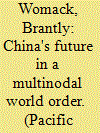

|
|
|
|
|
| Publication |
2014.
|
| Summary/Abstract |
Over the next twenty years China is likely to become the world's largest national economy, though not the richest one-fifth of the world's population. Chinese demographic power will be qualitatively different from American technological power despite bottom-line similarities in GNP, and China will face challenges of political and economic sustainability. Assuming that globalization, constrained state sovereignty, and demographic revolution continue as basic world trends, the world order is likely to be one in which concerns about conflicts of interests drive interactions, but no state or group of states is capable of benefitting from unilaterally enforcing its will against the rest. Thus, there is no set of "poles" whose competition or cooperation determines the world order, despite the differences of exposure created by disparities in capacity. Although the United States and China will be the primary state actors and their relationship will contain elements of rivalry as well as cooperation, the prerequisites of Cold War bipolarity no longer exist. Rather, the order would be best described as "multinodal," a matrix of interacting, unequal units that pursue their own interests within a stable array of national units and an increasing routinization of international regimes and interpenetrating transnational connections
|
|
|
|
|
|
|
|
|
|
|
|
|
|
|
|
| 3 |
ID:
130426
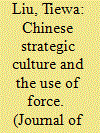

|
|
|
|
|
| Publication |
2014.
|
| Summary/Abstract |
This article reviews and explains Chinese attitudes towards the use of force in international affairs, especially from the perspective of strategic culture. The author traces back the traditional values which originated from ancient Chinese thoughts and also researches Mao Zedong's perception of war, which symbolizes the contemporary Chinese military strategic theory, and Deng Xiaoping and Hu Jintao's discourse on war thereafter, which represents the beliefs of the Chinese government after adopting the opening-up and reform policy. The case studies of the Korean War, the Vietnam War and the two Iraq Wars further explore the principles which dominate the diplomatic decision-making processes. The article concludes that China, in the predictable future, will still firmly adhere to the principles of state sovereignty, non-interference and non-use of force principles, while at the same time China will not hesitate to participate in the multilateral operations which are ratified with UN Security Council authorization and contribute increasingly to improving humanitarian situations due to its moral and political understanding of the use of force in international relations
|
|
|
|
|
|
|
|
|
|
|
|
|
|
|
|
| 4 |
ID:
133279


|
|
|
|
|
| Publication |
2014.
|
| Summary/Abstract |
We undertake an individual-level analysis of mass political behavior toward sovereign debt resettlement by leveraging the unique circumstances of a 2011 referendum on debt repayment in Iceland. This allows us to engage broader questions about mass international political economy. Against the recent thrust of a growing literature, we find evidence of material economic "pocketbook" effects-self-interest-on voting behavior, operating alongside symbolic/sociotropic and partisan/political logics. Contrary to expectations, these self-interest effects are not conditional on voter sophistication. We conclude that conventional sampling frames may be inappropriate for understanding contemporary democratic contestation over international economic policy.
|
|
|
|
|
|
|
|
|
|
|
|
|
|
|
|
| 5 |
ID:
131331
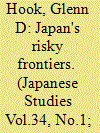

|
|
|
|
|
| Publication |
2014.
|
| Summary/Abstract |
This article investigates Japan's current role in the Senkaku Islands. The government maintains administrative control of these tiny, uninhabited islands and rocks at the frontier of Japan, but both the governments of China and Taiwan dispute Japanese claims to sovereignty and claim sovereignty over the islands themselves. Whilst much of the extant literature examines these competing claims, this article instead explores the relationship between risk, sovereignty and governance at the frontiers of Japan. It seeks to demonstrate in particular how the governance of Japan's maritime frontiers reflects a broader process of the recalibration of risk by the Abe Shinz? government as part of ending the postwar regime. Its main purpose is twofold: first, to illuminate how the government carries out administrative control and governance of a remote, uninhabited territory when sovereignty is challenged and in dispute; and second, to elucidate how the government's recalibration of risk generates a range of costs for the Japanese market and society as a result of the deterioration of relations with China arising from the way risk is being recalibrated.
|
|
|
|
|
|
|
|
|
|
|
|
|
|
|
|
| 6 |
ID:
130987
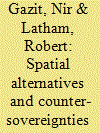

|
|
|
|
|
| Publication |
2014.
|
| Summary/Abstract |
The securitization of the spaces of Israeli-Palestinian interaction, from checkpoints to the West Bank Separation Wall, continues to intensify and receive attention from journalists, scholars, and activists. Understandably, the focus is on the negative consequences of existing spatial configurations. Receiving far less attention is the development of alternative spatial formations which might advance forms of "desecuritization," especially in those spaces that are crucial hinges of Israeli-Palestinian interaction (Jerusalem and other mixed cities, the Wall, the Green Line, roads). This article explores whether alternative ways of using, organizing, experiencing, and coexisting in space-especially at the micro level-hold out promise for helping to reframe significant dimensions of Israeli-Palestinian interaction. It seeks to better understand whether disjointed forms of sovereignty that appear-or disappear-across the occupation can be met by counter-sovereignties; whether new spatial counter-realities can be articulated through everyday life; and whether forms of agency, especially contestation, can reset understandings of, and perspectives on, spaces. A range of examples are considered within Jerusalem, mixed cities, the occupied Palestinian territories and at the border, bearing on religious sites, healthcare, gentrification, security infrastructure, popular protest, and festivals
|
|
|
|
|
|
|
|
|
|
|
|
|
|
|
|
| 7 |
ID:
126643
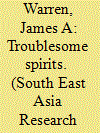

|
|
|
|
|
| Publication |
2013.
|
| Summary/Abstract |
Although alcohol has long been a feature of Thai society, historical evidence indicates that excessive drinking on a regular basis is a relatively recent phenomenon. During the nineteenth century, there were significant quantitative and qualitative changes in both alcohol consumption and production in Siam, due largely to the introduction of new alcoholic beverages and methods of distillation by Chinese immigrants and Western entrepreneurs. As public drunkenness became more common, excessive drinking was blamed for an apparent increase in violent crime throughout the kingdom. This paper examines how the Thai government tried to manage the upsurge in drunken behaviour and the obstacles it faced in doing so. Most of these problems stemmed from the limits on the kingdom's fiscal and judicial sovereignty imposed by the unequal treaties it had signed with the Western imperial powers; as such, they are indicative of Siam's semi-colonial status during this period.
|
|
|
|
|
|
|
|
|
|
|
|
|
|
|
|
|
|
|
|
|